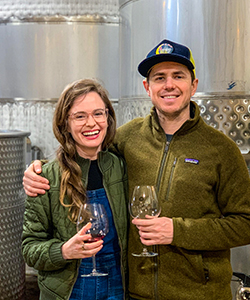 Samantha Holquist is an expert in community-engaged research methods, improvement science, and implementation science.
Samantha Holquist is an expert in community-engaged research methods, improvement science, and implementation science.
Samantha, can you begin by briefly describing your research activities and responsibilities at Child Trends?
I partner with youth, practitioners, communities, and policymakers to do important research and offer technical assistance. I predominantly use community-engaged research (CEnR) approaches, which is where researchers and community members partner to develop and implement a line of research. Because CEnR is so fluid, my work varies day to day: providing training to partners, supporting qualitative and quantitative research activities, creating dissemination products, or meeting with leaders to discuss recommendations for improvement.
Can you tell us about your primary research interest(s)?
Because my work uses CEnR approaches, my research aligns closely with my partners’ priorities. My work primarily helps education and justice systems address challenges and implement interventions to enhance youth success. Despite their intended purpose (supporting youth success), these systems may struggle to adequately meet the needs of all youth. I hope to transform these systems by centering the needs of youth, practitioners, and communities in change initiatives.
What sparked your interest in systems change work?
My own experiences of feeling disempowered as a young adult sparked this interest. I often felt like decisions were made for me rather than with me, that I lacked power to shape my future, and that the systems of support around me did not respond to my needs.
As a teenager and young adult, I actively advocated for changes to better meet my needs and those of my peers. From these experiences, I recognized a pervasive gap: Many people, myself included, did not gain the skills in their education experiences to conduct research, formulate actionable recommendations for change, and effectively advocate for those changes.
Therefore, I strive to help youth, practitioners, and communities gain the skills to transform systems. My interest in centering youth, practitioners, and communities in systems change also influences my choice to use CEnR approaches.
What books or journal articles have most influenced you?
Rather than list books and articles, I’d like to highlight the work of the Kentucky Student Voice team and other similar youth-powered organizations (e.g., StuVoice, Student Action Network for Equity, and Californians for Justice). These organizations highlight the many ways in which youth and adults can authentically partner to conduct research and advocate for change.
The Kentucky Student Voice team is a powerful testament to how youth can transform systems. Their work provides examples of how youth can organize their work, partner with adults to reach their goals, conduct excellent research, and communicate findings and actionable recommendations in a way that is accessible to both youth and adults. Whenever I experience a setback in my own work, I always draw inspiration and courage from them.
What are your hobbies or interests outside of research?
I spend most of my time outdoors with my family and friends. We do a lot of hiking—particularly along the northern shores of Minnesota and Wisconsin—swimming in our 10,000+ lakes, snowshoeing, touring wineries, and playing sports. My husband and I also try to travel to at least two new places a year. This year, we are going to Chattanooga, Tennessee and Melbourne, Australia.
To wrap up, can you tell us a fun or interesting fact about yourself or your family?
My husband and I are the proud parents of a 16-year-old cat named Pixel and a 2-year-old-dog named Maple. After some adjustment, Pixel now tolerates Maple and Maple thinks Pixel is her best friend. Additionally, in the past 13 years, I have lived in seven different cities and four of five U.S. time zones! I tend to like to move around, but my family is happily situated … for now.
Learn More
© Copyright 2025 ChildTrendsPrivacy Statement
Newsletter SignupLinkedInYouTubeBlueskyInstagram